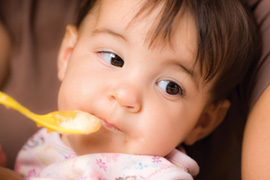As adults, we usually suffer from a sporadic cold or fever, perhaps three to four times a year. Children, on the other hand, especially toddlers and preschoolers who attend day care centres, are usually not so lucky.
The common cold or fever may strike a young child on average three to 12 times a year. And this does not include other ailments your child may suffer from, such as diarrhoea and so on.
Being sick often causes your child to lose his appetite, eat less than he normally does, or sometimes not eat at all. However, it is important for him to continue to eat his meals, as good nutrition is crucial for proper and faster recovery.
Why are good meals essential?
Infections not only reduce appetites, they may also adversely affect nutrient absorption by the digestive system. Some children may suffer from acute malnutrition and lose weight, especially if they do not eat enough. This is due to the fact that when insufficient nutrients are taken in, the body uses its own stores of fat and muscles for energy.
Acute malnutrition causes infections to become worse, as your child’s immune system may become less efficient, and is unable to fight infections effectively. Sick children also need plenty of fluids, especially clean, plain water, as they tend to lose more water than normal. Furthermore, they should continue to eat proper meals which are nutritious and healthy, especially during the recovery period after a sickness.
What should you feed your child?
There are certain foods and drinks you may need to withhold from your sick child, depending on his illness. However, feeding your child with regular nutritious meals is very important. Here are some suggestions on the types of food you could feed him:
If your child has: Fever
Children with fever often have little or no appetite. Try offering smaller meals, which are also higher in calories, as they would not be eating much. You can also offer bland meals such as oatmeal, chicken porridge or soup, and mashed potatoes. Offer plenty of fluids as well, especially plain water, or even juices, to combat dehydration that may occur with high body temperatures.
If your child has: Cold
Warm soupy foods, as well as soft and easy to eat foods often appeal to children with colds. This may include chicken soup or porridge, scrambled eggs, mashed potatoes, pancakes, and oatmeal. Warm foods can also act as a vaporiser, loosening nasal mucous congestion.
If your child has: Diarrhoea
Diarrhoea can usually be treated at home, and mostly involves preventing dehydration from occurring. Try not to provide any medication, unless prescribed by your child’s paediatrician. Offer your child plenty of fluids, which may include water, broth and oral rehydration salt solutions. Foods that are easy to digest, such as oatmeal or porridge, cooked vegetables in soups or broths, should be given as well.
Give him plenty to eat and drink!
It can be difficult to coax your young one to eat a decent meal when he is feeling under the weather. Try offering him smaller meals more frequently, that is, every 1-2 hours, instead of 2-3 big meals a day. Encourage him to eat as much as he can, but do not force-feed him – this may cause him to choke or throw up.
Food with a sweet taste can entice your child’s appetite, especially if he has been feeling nauseous or has been vomiting. You can offer mashed bananas or even ice-cream, or “tau foo fah” to help increase his appetite. Don’t forget to give him plenty of fluids, including plain water, fresh fruit juices, coconut water or even soups.
When your child starts to recover, his appetite will improve. Increase the variety of foods you feed him, as different types of food provide different nutrients. Also increase the frequency of feeding as his energy and nutrient requirements during recovery will be more than usual. Eating nutritious and healthful meals will help your child regain his energy and appetite for a faster recovery!






Comments